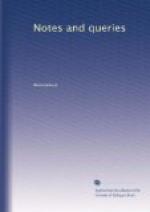A BARRISTER.
Forlot, Forthlot (No. 20. p. 320.).—A measure of grain used throughout Scotland at present—query fourthlot. See Jamieson’s Etymological Dictionary of the Scottish Language.
“Firlot; Fyrlot;
Furlet.—A corn measure in S., the fourth
part of a boll.
“Thay ordainit the boll to mat victual with, to be devidit in foure partis, videlicet, foure fyrlottis to contene a boll; and that fyrlot not to be maid efter the first mesoure, na efter the mesoure now usit, bot in middill mesoure betwixt the twa.”—Acts Jac. l. 1526. c. 80. edit. 1566.
“—Ane furme, ane furlet,
Ane pott, ane pek.”
Bannatyne Poems, p. 159.
Skinner derives it from A.-S. feower, quatuor; and lot, hlot, portio (the fourth part); Teut. “viertel.”
J.S.
Loscop (No. 20. p. 319).—To be “Louecope-free” is one of the immunities granted to the Cinque Ports in their charters of Liberties.
Jeakes explains the term thus:—
“The Saxon word Cope (in Low Dutch still Kope or Koope), for trade or merchandising, makes this as much as to trade freely for love. So that by no kind of monopoly patent, or company or society of traders or merchants, the portsmen be hindered from merchandising; but freely and for love, be permitted to trade and traffick, even by such company of merchants, whenever it shall happen their concerns lie together.”
In my MSS., and in the print of Jeakes, it is “Louecope,” with which “Lofcope” may be readily identified; and f may easily be misread for s, especially if the roll be obscured.
If Jeakes’s etymology of the word be correct, the inference would rather be that “Lovecope” was a tax for the goodwill of the port at which a merchant vessel might arrive; a “port duty” in fact, independent of “lastage” &c., chargeable upon every trader that entered the port, whatever her cargo might be. And the immunities granted to the portsmen were that they should be “port duty free.”
I do not venture to offer this as any thing more than a mere guess. Among your contributors there are many more learned than myself in this branch of antiquarian lore, who will probably be able to give a more correct interpretation, and we shall feel obliged for any assistance that they can give us in elucidating the question.
“Lovecope” might perhaps be the designation of the association of merchants itself, to which Jeakes alludes; and the liberty of forming such association, with powers of imposing port duties, may have been dependent on special grant to any port by royal charter, such as that which forms the subject of your correspondent’s communication.
After all, perhaps, “Lovecope” was the word for an association of merchants; and “Louecope-free” is to be freed from privileged taxation by this body.




